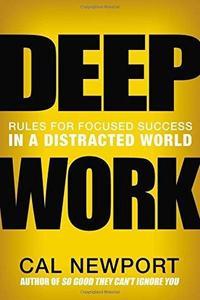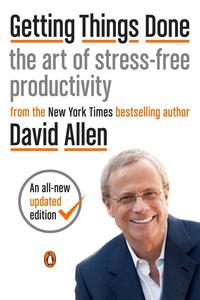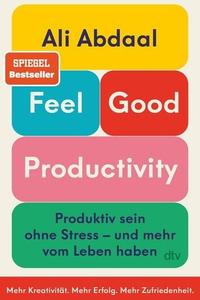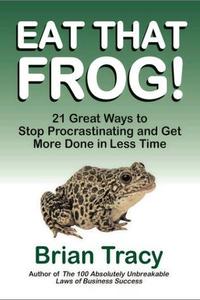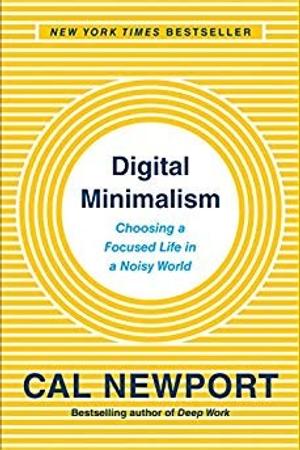
Digital Minimalism by Cal Newport: Summary & Notes
by Cal Newport
In One Sentence
Intentional digital tool use—keeping only what truly serves your values and discarding the rest—is essential for a meaningful life in the age of attention engineering.
Key Takeaways
- Digital clutter reduces focus, creativity, and well-being
- Do a 30-day digital declutter: remove all optional technologies
- Reintroduce only tools that strongly support your values
- Solitude is essential—schedule time completely unplugged
- Leisure requires high-quality activities, not passive scrolling
- Conversation over connection: real relationships beat likes
Summary
Newport makes an argument for how and why we should be reducing our use of social media, and technology in general, or at least being more specific and careful about our use. While it supported the growing concern of technology and social media use, I just didn’t find the information dense or compelling enough to warrant a full book. Worth noting that I’m already fairly cognizant of the issues surrounding technology use, so if you’re unfamiliar you may find more value.
Who Should Read This Book
- Anyone who feels controlled by their phone
- People who want to reclaim attention and time
- Parents concerned about screen time
- Those seeking more meaningful leisure
FAQ
What is digital minimalism?
A philosophy where you focus your online time on a small number of carefully selected activities that strongly support what you value, happily missing out on everything else. It's intentional use, not complete abstinence.
📖 Chapter-by-Chapter Breakdown
Click to expand the full detailed notes for every chapter →
📖 Chapter-by-Chapter Breakdown
Click to expand the full detailed notes for every chapter →
Notes
- We are highly susceptible to positive reinforcement and drive for social approval, which tech companies exploit when designing their products.
- Digital Minimalism: A philosophy of technology use in which you focus your online time on a small number of carefully selected and optimized activities that strongly support things you value, and then happily miss out on everything else.
- Essentially, digital minimalists think carefully about when and how to use technology, and use it only when it is the best tool to support a given outcome.
- Suggestion: The Digital Declutter Process
- Put aside a thirty-day period during which you will take a break from optional technologies in your life.
- During this thirty-day break, explore and rediscover activities and behaviors that you find satisfying and meaningful.
- At the end of the break, reintroduce optional technologies into your life, starting from a blank slate. For each technology you reintroduce, determine what value it serves in your life and how specifically you will use it so as to maximize this value.
- General heuristic: consider a given technology optional unless its removal would harm or significantly disrupt your daily personal or professional life.
- When reintroducing technology, it should:
- Serve something you deeply value (offering some benefit is not enough).
- Be the best way to use technology to serve this value (if it’s not, replace it with something better).
- Have a role in your life that is constrained with a standard operating procedure that specifies when and how you use it.
- Regular doses of solitude - defined as time your mind is free from input from other minds - is required for humans to flourish.
- When you avoid solitude, you miss out on the positive things it brings you: the ability to clarify hard problems, to regulate your emotions, to build moral courage, and to strengthen relationships.
- The studies of social media that found positive results focused on specific behaviors of social media users, while the studies that found negative results focused on overall use of these services.
- The key issue is that using social media tends to take people away from the real-world socializing that’s massively more valuable.
- In other words, there is a zero-sum relationship between online and offline socializing.
- Don’t click “Like." Ever. And while you’re at it, stop leaving comments on social media posts as well. Remain silent.
- The reason behind this is that they teach your mind that connection is a reasonable alternative to conversation, when in reality, you should be using connection merely to support conversation.
- Suggestion: set “office hours” for when you’re available via phone or in person.
- The Bennett Principle: expending more energy in your leisure, can end up energizing you more.
Leisure Principles:
- Prioritize demanding activity over passive consumption.
- Use skills to produce valuable things in the physical world.
- Seek activities that require real-world, structured social interactions.
- Practices to help build these habits:
- Fix or build something every week.
- Schedule your low-quality leisure.
- Join something.
- Follow leisure plans - create these seasonally and weekly, with objectives and habits.
- Practices to reduce media consumption:
- Delete social media apps from your phone.
- Turn your devices into “single-purpose computers”; have things blocked by default.
- Embrace “slow media” - focus on high-quality sources, arguments for both sides, and consume at set times during the week.
Conclusion:
- Adopting digital minimalism is not a onetime process that completes the day after your digital declutter; it instead requires ongoing adjustments.
- In my experience, the key to sustained success with this philosophy is accepting that it’s not really about technology, but is instead more about the quality of your life.
